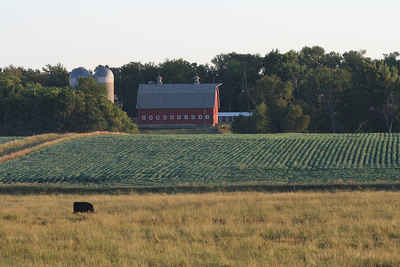Beadle County, South Dakota
Beadle County Education, Geography, and History

Beadle County is a county located in the state of South Dakota. Based on the 2010 census, the population was 17,398. Its county seat is
Huron. The county was created in 1879 and organized in 1880.
Beadle County comprises the Huron, SD Micropolitan Statistical Area.
Etymology - Origin of Beadle County Name
Beadle is named to honor Brig. General William Henry Harrison Beadle, pioneer, scholar, educator, lawyer, legislator and soldier.
Demographics:
County QuickFacts: CensusBureau Quick Facts
Beadle County History
Beadle County was created in 1879 from Buchard, Clark, Kingsbury, and Spink counties and organized in 1880. It was named to honor Brig. General William Henry Harrison
Beadle, pioneer scholar, educator, lawyer, legislator and soldier. It is said that Charles Miner was the first permanent
settler in the county. He located near the mouth of Pearl Creek in April, 1879, made some improvements for the winter,
but settled on his claim in the spring of 1880.
In June and July of 1879, soon after Miner had settled on his claim, several other selected and filed claims in the same
neighborhood along the James River. Early in the spring of 1880 settlement began to become general and continuous.
During that spring and summer railroad construction was going on and brought a considerable number of people into the
county, many of whom took claims and remained. The land along the James River was generally the first to be taken, the
settlements extending back gradually over the prairies. During the next two or three years the greater part of the
desirable lands in the county had been filed on.
The town of Cavour, the first in the county, was laid out in August, 1879, but the first building, a hotel owned by D.A.
Hart, was not erected until the following May.
The original town of Huron was platted May 10,1880, several additions being platted soon after. The first building in
the town was one 12 x 16 feet moved from near the James River by W.B. Ingersoll and John Cain, and used as an office for
the Beadle County Settler, a paper published by John Cain. Other buildings were soon after moved or built, and the town
grew rapidly as soon as lots were placed on sale.
On July 4, 1880, Governor Ordway appointed Eli C. Walton, Charles Miner, and S.S. Neilson as commissioners to organize
the county.
This board met at the Riverside Hotel at Huron on July 26, 1880, and proceeded to organize the county by appointment of
officers. The first officers were: John H. Alexander, Register of Deeds; James E. Bishop, Superintendent of Schools;
A.M. Farrington, Coroner; W.B. Ingersoll, Judge of Probate; Watson Weed, Assessor; W.B. Joy, Surveyor; A.J. Wells, A.H.
Aisdon, Dennis H. Flynn, E.J. Lymand , Justices; William Mixter, W.J. Easton, M. Baum, M.A. Falls, Constables; and E.G.
Wheeler, Tresurer. The county seat was located at Huron July 28, 1880, by the County Commissioners, and their choice was
later ratified by a vote of the electors.
Geography: Land and Water
As reported by the Census Bureau, the county has a total area of 1,265 square miles (3,276 km2), of which,
1,259 square miles (3,260 km2) of it is land and 6 square miles (16 km2) of it (0.48%) is water.
Neighboring Counties
Bordering counties are as follows:
- Spink County, South Dakota - north
- Clark County, South Dakota - northeast
- Kingsbury County, South Dakota - east
- Sanborn County, South Dakota - southeast
- Jerauld County, South Dakota - southwest
- Hand County, South Dakota - west
Education







